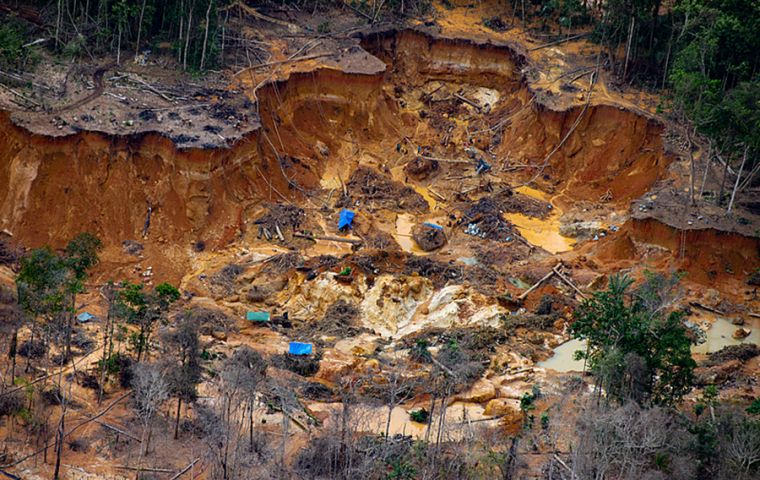MercoPress. South Atlantic News Agency
Garimpo is lethal, Brazilian minister says
 “What is being reported is still far from showing the reality there,” Guajarara said after visiting the Yanomami land
“What is being reported is still far from showing the reality there,” Guajarara said after visiting the Yanomami land Brazil's Minister for Indigenous Peoples Sonia Guajajara described the presence of illegal mining (known locally as “garimpo”) in the Yanomami Indigenous Land as destructive, Agencia Brasil reported Monday.
The official spent Sunday night at the Surucucu base camp near the border with Venezuela in the western part of the territory and returned to Boa Vista on Monday, where she spoke to the press.
“What is being reported is still far from showing the reality there, with such a strong presence of miners, with great destruction in the territory. It is a lot of mining, infinite mining, the whole territory is taken over by miners, by destruction, by contamination of the water. The Yanomami have no way of drinking water, no clean water to drink,” she said.
The minister flew over the regions of Homoxi and Xitei, which are two of the areas with the greatest presence of miners, and said that she was unable to land in the most isolated communities due to a lack of security. According to her, the miners are concentrated in the larger villages as a form of protection.
“We tried to land in two places and we couldn't, because of insecurity. And they are fleeing from the smaller mines and concentrating on the larger ones, they are all staying together,” she said. Guajarara also explained that, in some places, it is no longer possible to “discern what is the indigenous community from what is the mining.”
The minister also spoke about the death of an indigenous baby, who could not be removed to Boa Vista because of bad weather, and the murder of three indigenous people by miners. At least one body has been
handed over to the family and two are still to be rescued. One of them was killed in the Homoxi region and the other two in the Parima region. The Federal Police (PF) is carrying out operations in the territory to investigate the crimes.
Guajajara also said that, within three weeks, the Surucucu airfield will be ready, which will allow larger aircraft to land. The measure will make it possible to structure a field hospital to attend more complex cases without the need to airlift all patients to Boa Vista.
According to the local coordinator of the Center for Emergency Operations (COE), Ernani Santos, the demand for care should increase in the coming demands and the construction of a new hospital will relieve the capital's network. ”We understand that the demand will increase. Our intention is that this hospital can give this support, because today, one-third of the admissions here at the Children's Hospital in the city [Boa Vista] are Yanomami. And the Casai [Indigenous Health House] is at its limit. In this Monday's balance sheet, the COE informed that there are 598 indigenous people in the Casai, among patients and companions. At the Children's Hospital in Boa Vista, there are 50 indigenous people hospitalized, four of them in the Intensive Care Unit. The government expects that in the next few days, another nine teams of the National Force of SUS will disembark in the territory. The total number of teams should reach 25 by the end of the week.
The federal government is also reassessing the distribution of basic food baskets to the Yanomami people. The food being sent is not part of the traditional diet of the indigenous people and is also being sought by miners who, prevented from leaving the territory by air, are also running out of supplies.
According to Lucia Alberta Andrade, director of Sustainable Development Promotion at the National Indigenous Peoples Foundation (Funai), the Yanomami want to resume their production urgently. “We are going to start supporting some villages, which are a little calmer, to start producing their crops. They no longer want to consume the baskets that we are sending them. They want to produce, to plant their manioc, their banana. And this has been requested,” she explained.
The Ministry of Social Development and Fight against Hunger must also act to drill artesian wells and build cisterns in the Yanomami Indigenous Land to guarantee the supply of drinking water since the contamination of the rivers by mercury used in mining has made it impossible for the indigenous people to drink the water and is a source of disease.
(Source: Agencia Brasil)




Top Comments
Disclaimer & comment rules-

Read all commentsMining in the humid equatorial forest is the fastest way to destroy that habitat.
Feb 07th, 2023 - 01:51 pm 0A great challenge for humanity: what is worth more, life or money?
As long as there is no technology capable of extracting minerals and rare earths without harming the forest, the total ban on mining must continue. At any cost!
Commenting for this story is now closed.
If you have a Facebook account, become a fan and comment on our Facebook Page!